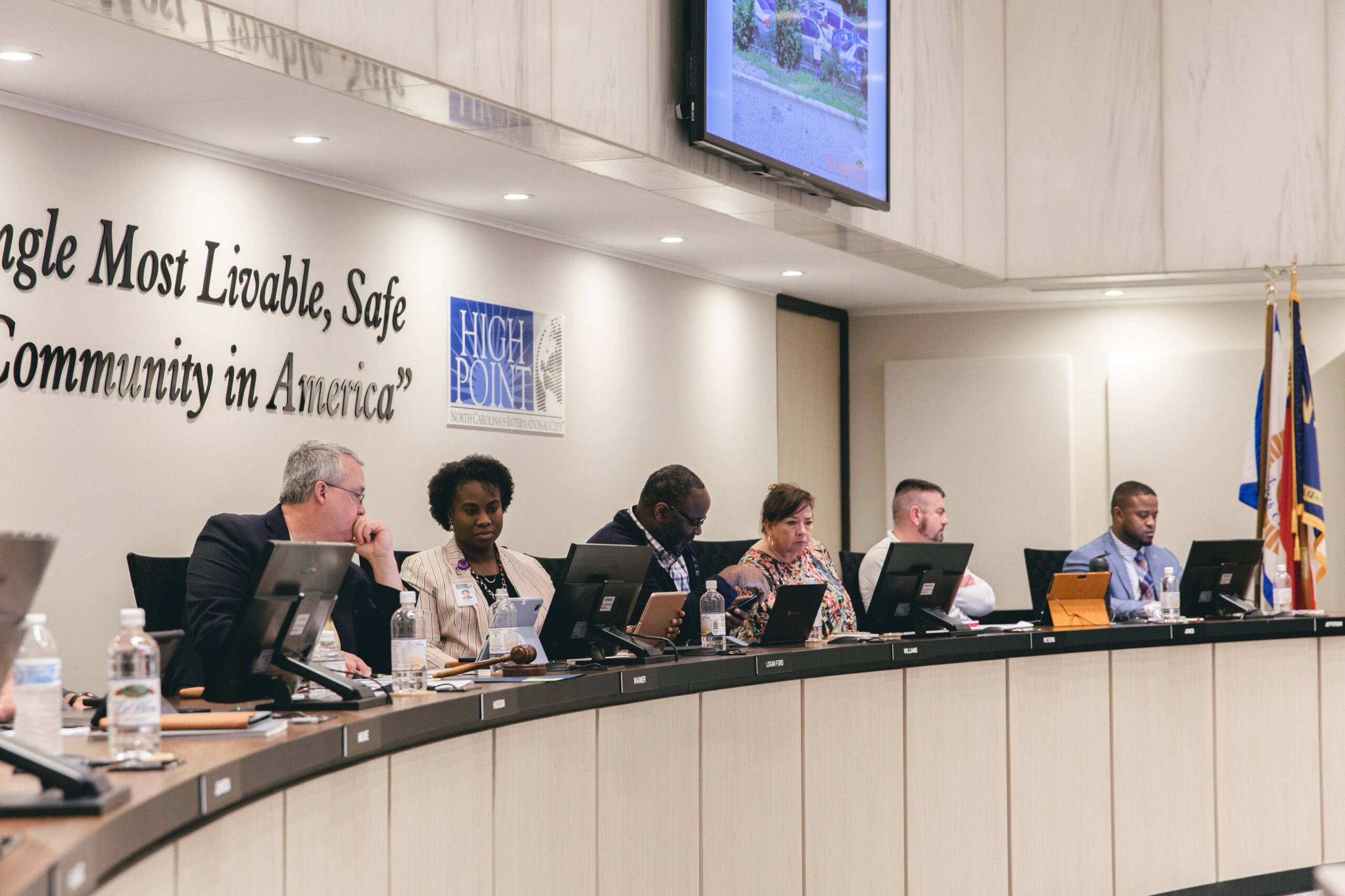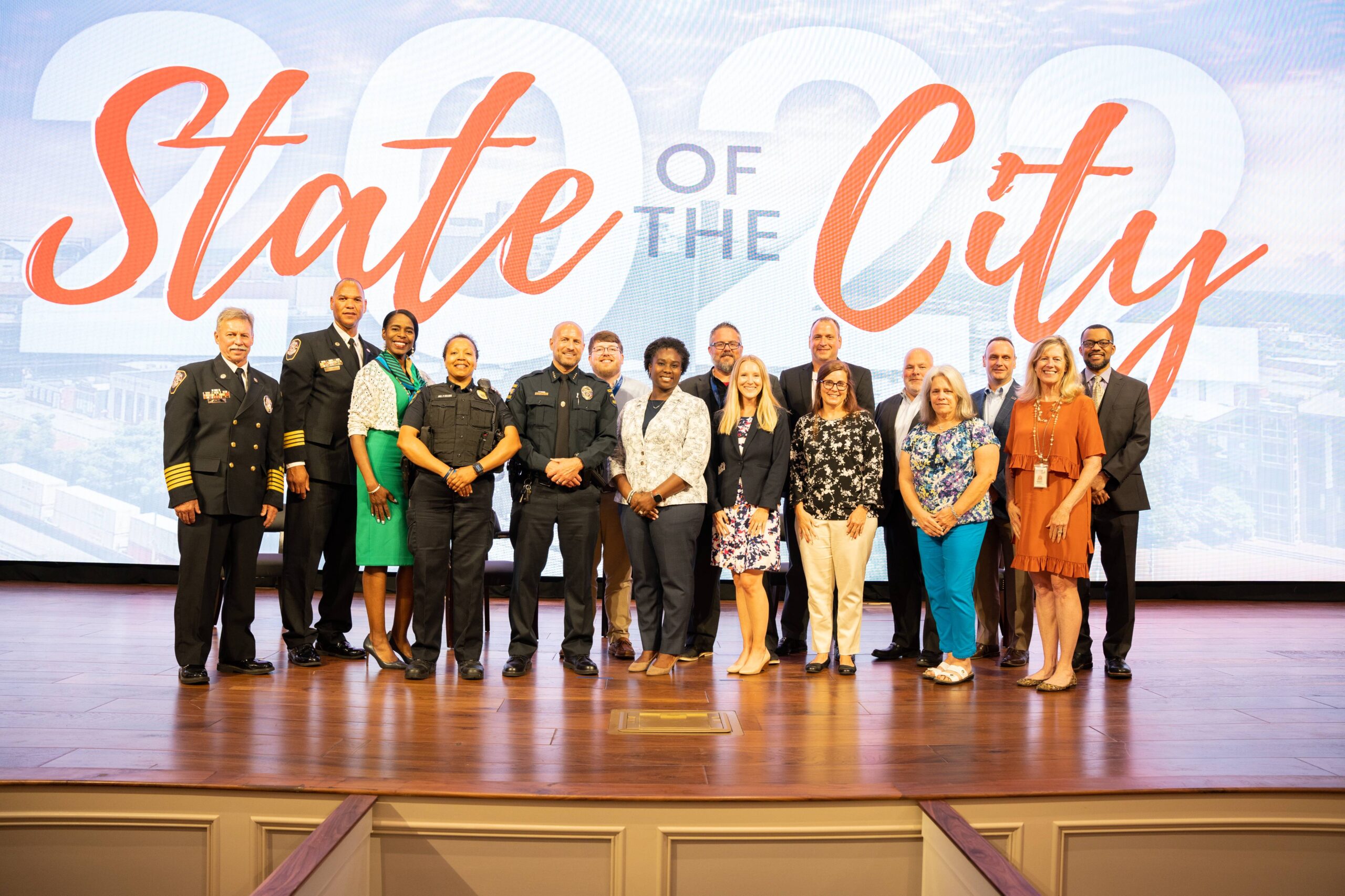The backbone of our state is our cities. And the backbone of our cities is our managers. It’s a task taken up by a select group of dedicated, community-minded public servants.
Some days, its strategic steps, planned and plotted and pursued with a long-term vision of what a city can become. Other days, it’s just the immediate—just the crises.
“Depends on the day,” says High Point Manager Tasha Logan Ford, laughing. “I’m intentional in planning goals for each day, organizing the broader objectives of our Council into steps our staff team needs to execute, but I also have to be flexible to respond to what may be waiting as the day breaks. Many times, the plan has changed before making it to the office.”
To be a manager is to tackle both and to not know which is coming. The job seems to be one of both optimism and perseverance—of both racing between fires and muscling through problems. In both cases, it’s about finding solutions, consistency, relationship building, and carrying a message of hope. As difficult as it rightfully appears, a class of professionals all across North Carolina take up the mantle as a career. They’re not the face of their town, but they might be the backbone.
Managers are the CEOs of local government. They come from a variety of public service backgrounds. Some rise through the ranks of a single city. More commonly, others serve a number of towns. Logan Ford began her career in Goldsboro, rising to the ranks of assistant city manager before taking the same position in the larger jurisdiction of Winston-Salem. Her background is purely administrative, working primarily in managers’ offices. Others work their way through budget departments or planning departments or, as a more recent trend, community development departments. Each come with their own unique experiences and skill sets, but only the role itself can provide the full load of responsibilities.

The job title is familiar to most. The inner, day-to-day workings are somewhat harder to see, though they’re by no means a secret. Like most public service jobs, it just gets done, with little fame or fanfare. It starts for Tasha Logan Ford with a read through the local newspapers and a glance through Google Alerts. “Before I come into the office, I like to have an idea of what’s going on in the community and to get a pulse of what people might be talking about globally.” From there, it transitions to the operational needs of every single day: housing, police, fire, garbage collection, water, and sewer, just to name a few.
Perhaps, most notable in the responsibilities of a city manager is the relationship with the governing board. As the key connection between an elected body and city staff, the manager oversees far more than just administrative duties. They also serve in a communications role, a support role, and many times, a strategic role.
“The job is whatever it needs you to be on a given day,” says Logan Ford. “To be successful in the job, it requires presence of mind in each situation, a significant investment of time, trust, and grace.”
Step foot in any collegiate public administration course, and the first lesson you’ll hear is this: for a public organization to succeed, they must understand and respond to their stakeholders. Managers are the embodiment of that guidance. Logan Ford, recapping just a single week, notes that she had meetings with her staff, the local chamber of commerce, several foundations and nonprofits, and, of course, the High Point City Council. Other weeks bring different audiences. At the same time, citizens voice their concerns and needs, and Logan Ford must position the staff team to be responsive to them as well.

In High Point, city leadership is able to address both long-term and short-term needs through a team structure. Logan Ford often relies on her executive team to take on the day-to-day operations, which allows her to fully engage the litany of stakeholders—all of whom have a part to play in the strategic direction of the city. “It requires a team committed to the core values of this organization and the broader community,” Logan Ford says. “We seek to strike the right balance, by engaging with our elected body to build consensus around a set of common goals and then executing through the talent of our employees.” Even with ample support, managers are involved with all city business and it can lead to one of the pitfalls of the job: burnout. The daily emails number in the hundreds, as do the weekly phone calls, and few if any workdays end at 5pm.

NCLM’s Heather James sees the weight of the role firsthand. As the League’s Manager for Operational Outreach, James runs the League’s interim manager program, which places retired municipal managers temporarily in manager-less towns. The program ensures continuity of service and provides the town with additional time to recruit for the position. And in recent years, demand for the program has increased. “It’s a really, really difficult job. It is 24/7,” James said of town managers. “Those with families, aging parents, anything outside of work—it can be hard to balance that.”
As with many public sector roles across the state and country, recruiting and retaining employees has been a challenge since the COVID-19 pandemic. That’s especially true for managers, who tout an executive-level skillset, supervise large staffs, and direct large and complex budgets. That’s a background with obvious appeal in any industry. It is not uncommon to see managers get recruited to the private sector.
And still, despite that competition, North Carolina hosts a dedicated core of municipal managers. James sees it through the interim program and the retired managers that continue coming back to help communities. “These managers are so committed to the profession because they’ve seen what success looks like in our towns,” said James. “Once you get one success you want to continue getting more and more. Even minor changes can be huge for a town. None of them are there for the money. They’re community driven.”
Logan Ford notes the same motivation. Through the state’s many managers and their different personalities and different towns in which they work, the element that binds the group is consistent to a person: the desire to watch a community prosper and to have a hand in that success.
“I’m in public service because I care about the community. I fundamentally believe we can create spaces where people can use their talents to define their version of success, be successful in a way that is meaningful to them and support the broader economic vitality of the region. I want to see a community that’s thriving. I want to see a community that’s creating their own sense of identity with growing businesses and community ties that bind. In High Point, we will attract generational investments and residents who feel they can be successful,” says Logan Ford. “There’s nothing personal in it for me. It is about being able to leave this environment—whether it’s my community environment or the environment of my organization—in a better position than it was when I found it. That is what motivates me every day and gets me excited about the work we do.”
“Those who stay in this work do so because they want their community to be successful. It’s adaptive work and Managers are committed to that ideal and the process to make it happen.”














